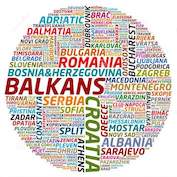Call for Proposals
CALL FOR PROPOSALS
The Third Balkan Studies Conference Cities of the Balkans: Local, National, Global Scales
September 12th & 13th 2019, Marseille MuCEM — Musée des civilisations de l'Europe et de la Méditerranée
This conference aims to continue the work carried out during the Second Balkan Studies Conference titled “In search of the Balkans: Between Europe and the Mediterranean?” which took place in May 2016 in Marseille (Mucem and Villa Méditerranée). With the aim of underpinning the relaunch of the French Association of Balkan Studies (AFEBalk - Association Française d’Études sur les Balkans), the conference aspires to widen the network of French-speaking researchers working on Southeastern Europe by promoting cooperation between researchers based in France and their colleagues abroad. The 2019 conference will focus on urban spaces, a multidisciplinary subject, as reflected by the soaring of urban studiesin social sciences.
Social, economic and political transformations, in the Balkans and elsewhere, have deeply shaped urban landscapes. These spaces are thus incredibly fertile fields of observation to understand the many processes at work in Balkan societies. In the meantime, these cities are marked by local, national or global power-struggles and make it possible to address issues that go beyond them.
If the most ancient cities of the region are often coastal trade places fitting the widespread model of the Mediterranean city, the advent of Ottoman and Habsburg Empirescontributed to the emergence of another urban type in the region, notably characterized by administration and military control. With the affirmation of Nation-states during the 19th Century, relations between societies and territories were profoundly altered, making cities the main centers of economic and political activities, and resulting in a macrocephaly, more pronounced than in any other region of Europe.
Cities that were freshly promoted to the rank of capitals, along with minor urban centers, started to reveal the economic and cultural dynamics, and the complex and often contradictory identity reconfigurations of the Balkan region. These cities have been extensively and widely analyzed from a top-down perspective, and yet it is certain that these spaces have been reshaped as much by major events such as wars, arsons and revolutions, as by the daily experiences of their dwellers. Manifold political and social movements – nationalism, socialism, feminism, among others - and their emancipation promises have not considered the city only as a stage, but they have also constantly molded it.
However, in the Balkans, as elsewhere in Europe and the Mediterranean, contemporary cities are deeply marked by the period that started in the 1950’s and by the explosion of urban population inducted by the transformation of lifestyles, demographic changes, social and political shifts resulting from socialism and then post-socialism. In the last decades of the 20th Century, many upheavals affecting the region reflected worldwide processes such as the fall of the Berlin wall, the end of the Cold War, armed conflicts resulting from the dissolution of Yugoslavia, the reconfiguration of Nation-states, the processes of integration to the European Union, as well as internal and international migrations. All these events had an impact on the deep mutation of urban spaces. During this period some Balkan cities (re-)positioned themselves, shifting towards new distinctive urban models, often unfit to understand the far more complex reality on the ground: cities in conflict, contested or divided cities, multiethnic or cosmopolitan cities, internationalized cities, cities in crisis, Global(ized) Cities.
In the beginning of the 21st Century, everywhere in the Balkans, poverty, informal housing, lack of infrastructures, segregation or poor waste management threat the daily life of city dwellers. Nonetheless, these urban spaces have remained places of innovation, of resistance, of solidarity and political and social experiments, as recently showed by the Greek crisis, the various public space takeovers, the movements of support for refugees, etc. At the same time, urban lifestyles and practices gradually come to prevail in areas that have been for a long time dominated by rural lifestyles, questioning thus the shifting boundaries between the rural and the urban.
We welcome papers that address the following topics:
- Heritage, monumentalization and preservation - The everyday making of the city - The city and social movements - (In)visible borders (class, nation, religion, gender, sexualities) - The city and the population management - Ecological and environmental approaches to the city - The city and Power liturgy - The language(s) of the city - Consumption culture - Cities and geopolitical issues - City branding and commodification - The urban/The rural
Abstracts
Languages of the conference: English, French
Individual abstracts: 300 words + 5 key words + 5 line-bio including affiliation
Panel abstracts: 500 words + 5 key words + 5 line-bio including affiliation
Schedule Closing date for submission: 22 February 2019 Extension: 1st March Answers: 10th of March 2019
Submission: Abstracts should be submitted via the dedicated page on this website.
There will be no budget for transport or accommodation for participants. However, some demands can be addressed to the organization committee which will decide according to the budget. There is no participation fee.
We are looking forward to welcoming you in Marseille!!
|


